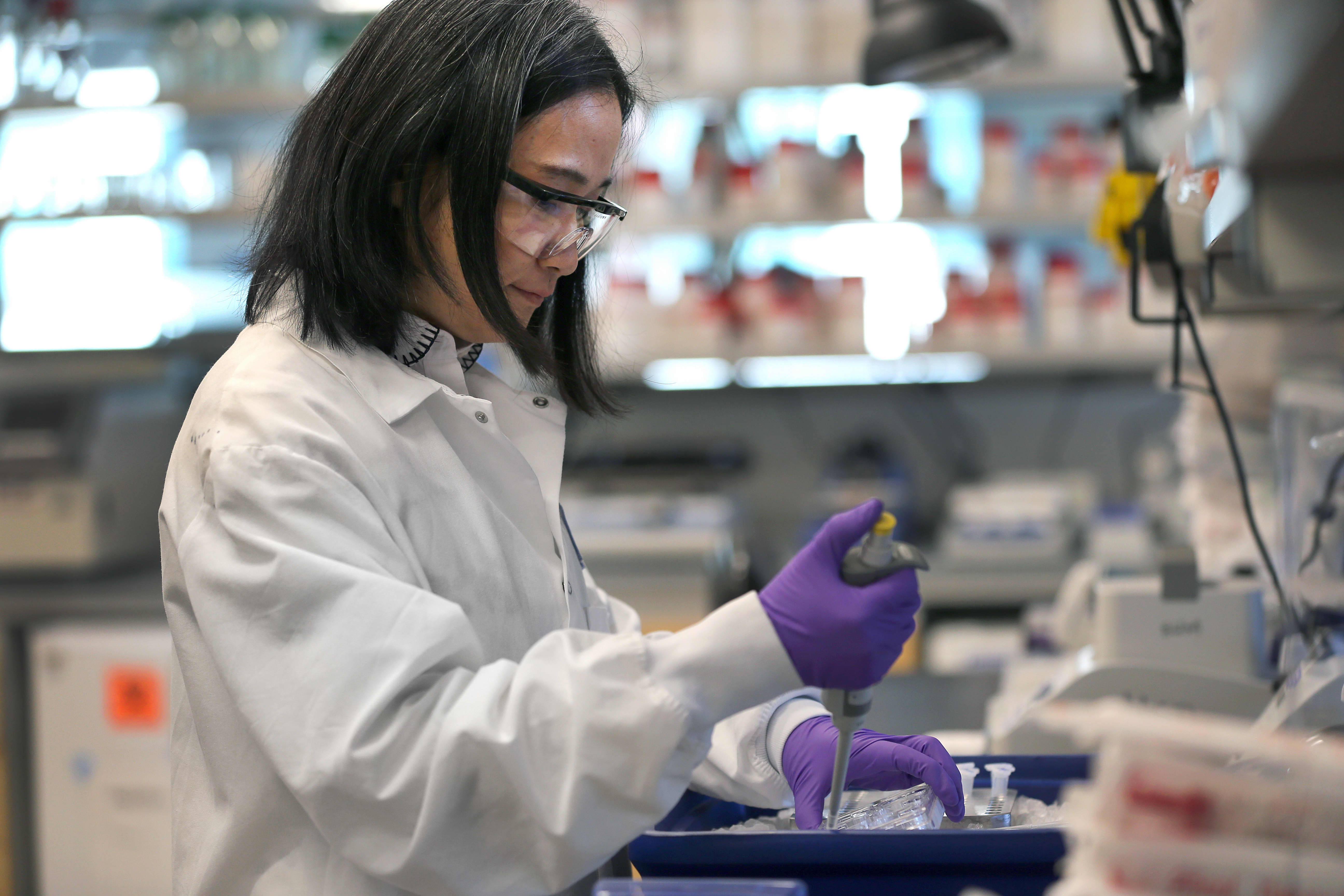
Scientist Xinhua Yan works in the lab at Moderna in Cambridge, Massachusetts, on Feb. 28, 2020.
David L. Ryan | Boston Globe | Getty Images
Stock markets around the world surged on Tuesday as hopes for a coronavirus vaccine and the easing of lockdown restrictions worldwide drive investors back toward risk assets.
Stocks in Asia Pacific led the charge during Asian trading hours on Tuesday, led by a 2.55% gain for Japan's Nikkei 225 as the country lifted its state of emergency.
European markets then followed suit, the continent-wide Stoxx 600 benchmark climbing 0.9% in early trade, led by a 6.5% bounce for the beleaguered travel and leisure sector.
Meanwhile, futures stateside were pointing to a gain of around 500 points for when the Dow begins trade on Wall Street.
The broad gains came about after American biotech firm Novavax on Monday said it had started the first human study of its experimental coronavirus vaccine, with initial results on safety and immune responses expected in July.
U.S. drugmaker Merck on Tuesday said it plans to work alongside IAVI, a non-profit scientific research organization, to develop a potential vaccine against the coronavirus.
This followed Moderna's announcement last week that all 45 patients in its vaccine trial had developed antibodies against the coronavirus, which has now infected more than 5.5 million people worldwide and devastated the global economy.
Global stock markets have seen a resurgence so far this quarter, recovering from the mass sell-off in mid-March which sent most indexes into correction territory, as the coronavirus pandemic took root in Europe, the U.S. and elsewhere in Asia.
The Stoxx 600 is down 16% for the year to date but up around 9% since the beginning of April, while the Dow and S&P 500 have gained more than 11% and 14% respectively in the second quarter.
April's gains on the Dow and S&P 500 marked the largest monthly surge in equity prices since 1987.
Denying 'economic reality'
However, a key driver of the market's resolve of late has been unprecedented monetary and fiscal stimulus measures from central banks and governments, with trillions of dollars pumped into asset purchases aimed at shoring up economies.
Steve Ellis, global chief investment officer for fixed income at Fidelity International, said in a note Monday that this deluge of money will see risk assets do well this year, but cautioned that investors were ignoring the "economic reality" in which global GDP (gross domestic product) is contracting at "breakneck speed."
"This sudden, massive increase in debt will continue the trend of zombification, as real interest rates and growth head ever lower," Ellis said.
Zombification refers to the phenomenon through which companies with insufficient capital to pay their debts are kept alive artificially through cheap borrowing costs. This can lead to a prolonged period of economic stagnation as seen in Japan.
"The cleansing moments that normally rid the system of a build-up of unproductive debt may be painful at the time, but they ultimately lead to a more efficient allocation of resources. Policy makers have chosen again to avoid that path, storing up economic pain for the future," Ellis added.
However, he recommended that investors avoid becoming too pessimistic for as long as central banks remain in play, with the risk-free rate on bonds being driven so low that investors will have little choice but to return to risk assets even as the economic downturn unfolds.
Lessons from the 'reopeners'
With some countries further along the path to economic reopening than those worst hit by the virus, several cues can be taken from both the medical and market reactions thus far, according to Goldman Sachs Emerging Markets Economist Ian Tomb.
In a note Monday, Tomb highlighted that the early openers have not yet seen a higher incidence of confirmed coronavirus cases, though he cautioned that this is merely "suggestive" at this early stage.
Tomb also pointed out that markets have begun to tentatively reward the early openers.
"We use a dataset of over 100 different financial indicators from 33 countries, and an econometric framework based on comparing countries that have opened up more versus less quickly, to show that — in contrast to the 'deep lockdown' period of early April, when opening up was associated with lower asset returns and tighter financial conditions — most financial markets we consider have now begun to reward reopening with modestly higher asset returns and easier financial conditions," Tomb explained.
However, he suggested that countries with low daily caseloads, such as New Zealand, were benefiting more significantly from reopening than those with comparatively high incidence rates. The progress of reopening and associated risks will shift daily on a country-by-country basis as their respective processes are rolled out, Tomb anticipated.
"come" - Google News
May 26, 2020 at 06:40PM
https://ift.tt/2Zy92L8
Global stock markets rally as coronavirus vaccine hopes come into focus - CNBC
"come" - Google News
https://ift.tt/2S8UtrZ
Shoes Man Tutorial
Pos News Update
Meme Update
Korean Entertainment News
Japan News Update
Bagikan Berita Ini














0 Response to "Global stock markets rally as coronavirus vaccine hopes come into focus - CNBC"
Post a Comment